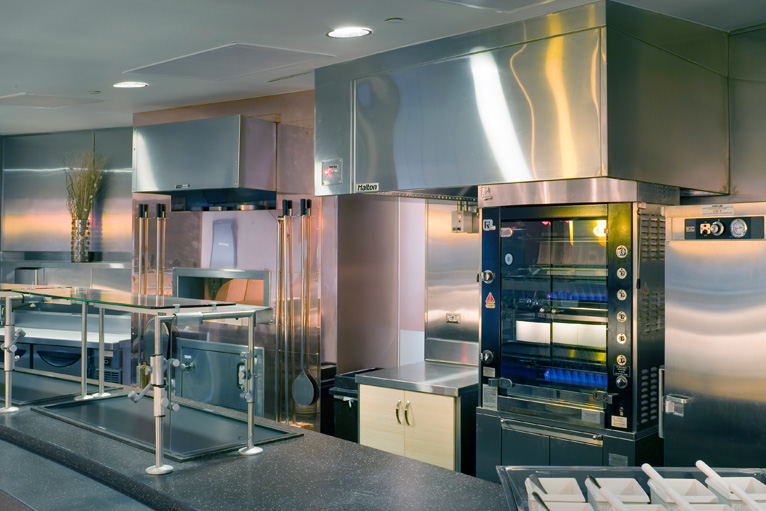In the past most exhaust hood systems were designed at minimum code airflow values that were based on the square footage of the hood reservoir. This meant when the hoods were longer and deeper the required exhaust airflow went up accordingly causing large amounts of air to be exhausted through the hood system.
Today, most engineered hood systems are designed at their UL Listing or calculated airflow requirements based on the appliance being used. This evolution has decreased the amount of air flows required to engineered hood systems today.
There are some manufacturers who provide energy efficient hoods operating typically 30% less CFM than traditional hood system.
As many hood filters have also become more efficient so is the static pressure and noise that can be created. Utilizing an energy efficient grease filter can greatly improve the amounts of grease collected at the hood level, however if designed with too high of exhaust can cause much higher NC levels in the kitchen. Some manufacturers have exhaust hoods that are designed at 40-50 NC that utilize patented grease filters.
Today, Demand Control Ventilation (DCV) systems are more commonplace in kitchen designs. These systems allow for reducing the exhaust airflows based on the cooking activity, thus also reducing the associated noise in the kitchens. While basic DCV (Temp Only systems) can only reduce the airflows 20% more engineered systems can reduce the airflow up to 70%. These airflow reductions happen when the kitchens are only operating a few appliances which is typical during the normal preparation work that is done each day in a commercial kitchen allowing the operators to enjoy much quieter conditions in these kitchens to allow for better communication and less stressful environments.
What else can contribute to a noisy exhaust hood?
If your kitchen exhaust hood is making excessive noise, several factors could be contributing to the issue:
Exhaust Fan Selection – Make sure the exhaust fan is properly matched to the hood system requirements. Choosing a fan with too high RPM or one that is undersized can increase noise levels significantly.
Ductwork – Ductwork vibration can also be a source of noise transmission to the hoods in the kitchen space. Additionally, it is best practice for the velocity of the air in the ductwork not to exceed 1800 feet per minute at design airflow conditions.
Fan Belt Condition – Check the fan belt for any signs of wear, slipping, or damage. A worn or damaged belt can decrease fan efficiency and add noise to the system.
Exhaust Fan Bearings – Inspect the bearings of the exhaust fan on a regular maintenance schedule. Worn-out or dry bearings may produce noise and should be lubricated or replaced as needed.
Fan Wheel Balance and Condition – Ensure the fan wheel is balanced and not damaged. An imbalanced, damaged or dirty fan wheel can create noise, especially if it’s rubbing against the fan shroud.
Regular Cleaning – Clean the exhaust fan regularly to remove dirt, grease, and debris. Buildup on the fan blades can disrupt airflow and increase noise.
Vibration Isolators – Vibration isolators serve to further reduce noise transmission by damping vibrations by using neoprene mounts or springs which act as shock absorbers and reduce vibrations transmitted to the building structure.
Grease Filters – Clean or replace grease filters according to the manufacturer’s recommendations. Dirty filters can reduce airflow efficiency and contribute to noise.
Proper Installation of Grease Filters – Verify that grease filters are correctly installed in the hood. Incorrect installation can disrupt airflow patterns and lead to increased noise levels.
Addressing these aspects should help mitigate the noise from your kitchen hood system. If noise issues persist despite these efforts, seeking assistance from a professional technician specializing in kitchen ventilation systems may be necessary to diagnose and resolve the problem effectively.
Also realize that there are several other sources of noise in a commercial kitchen that can contribute to producing a noisy environment including cooking operations, dishwashers, cooking equipment or cooking process.
Do you have any questions? Leave us a message below or please send your questions by using the “Ask the Expert“
Subscribe to kitchenventilation.com
Stay up to date by subscribing to Halton’s Commercial Kitchen Ventilation articles by entering your email address to subscribe and Halton will provide you with the latest information on commercial kitchen exhaust hoods, pollution control units, air handling, and safety systems. You will receive notifications of new posts by email.

